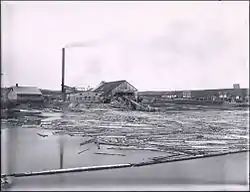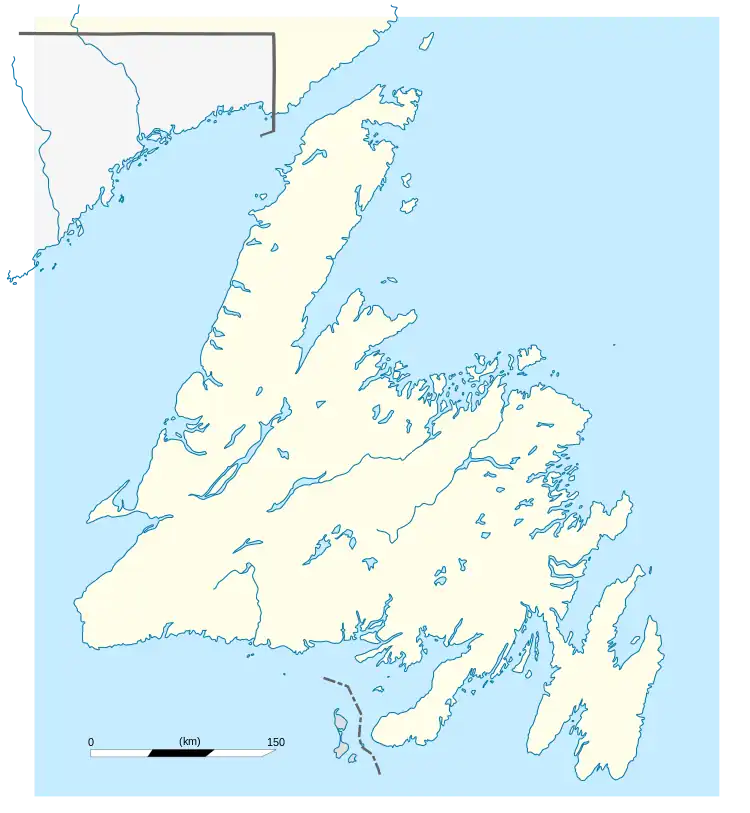Botwood
Botwood is a town in north-central Newfoundland, Newfoundland and Labrador, Canada in Census Division 6. It is positioned on the west shore of the Bay of Exploits on a natural deep-water harbour. Historically, this harbour has been a significant hub for cargo ships and seaplanes. Botwood served as the North American endpoint for the first transatlantic commercial flights.
Botwood | |
|---|---|
Town | |
 Exploits River Lumber and Pulp Company | |
 Seal | |
| Motto: En Avant (French for "Onward") | |
 Botwood Location of Botwood in Newfoundland | |
| Coordinates: 49°09′00″N 55°22′00″W | |
| Country | |
| Province | |
| Census division | 6 |
| Government | |
| • Mayor | James "Jim" Sceviour[1] |
| • MHA | Pleaman Forsey (PC) |
| • MP | Clifford Small (CPC) |
| Area | |
| • Total | 15.05 km2 (5.81 sq mi) |
| Elevation | 41 m (135 ft) |
| Population (2021)[3] | |
| • Total | 2,778 |
| • Density | 180/km2 (480/sq mi) |
| Time zone | UTC-3:30 (Newfoundland Time) |
| • Summer (DST) | UTC-2:30 (Newfoundland Daylight) |
| Postal code span | |
| Area code | 709 |
| Highways | |
| Website | www |
History
Early History
In 1908, construction began on the Botwood Railway; the railway ran between Bishop's Falls and Botwood. It was a joint effort between the A.N.D. Company and the A. E. Reed Company of Bishop's Falls. It was to be the transportation link for the export of pulp and paper from the newly built mill at Grand Falls, NL. The railway became operational by the fall of 1909, and the first shipment of paper from the new mill was sent in February 1910. The A.N.D. Company took control of the railway operation in 1910, just a year after the line was completed.
The first aircraft facility in Botwood was established by Captain Sydney Bennett, who was born in Newfoundland (1897–1945), and Major Sidney Cotton from Australia (1894–1969). From 1937 to 1945, both Pan Am and the British Overseas Airways Corporation used Botwood as a terminal for their Atlantic crossings. On June 27, 1939 the Yankee Clipper left Botwood for the first Trans-Atlantic passenger flight to Foynes, Ireland, its counterpart terminal for the shortest route to Europe.
World War II Period
Botwood became host to many dignitaries and celebrities, some as part of official delegations and others who were stalled there waiting out inclement flying weather. In 1943 Bob Hope and his troupe were stormbound in Botwood and performed for the RCAF Coastal Command. Franklin Delano Roosevelt, Winston Churchill and Charles Lindbergh are among some of the other well-known figures that have stayed in the town.
During World War II (1940–1945), the Royal Canadian Air Force changed Botwood into a patrolling and bombing seaplane base. It was home to two squadrons of PBY Canso flying boats equipped with torpedoes and depth charges. A large concrete slipway, two hangars, a tarmac and four bunkers were constructed.
The Canadian Army was garrisoned in the town, and built barracks, a water system, and a full-scale military hospital. The army was responsible for the manning of gun batteries at Philip's Head and Wiseman's Cove that protected the entrance to Botwood Harbour with 10" guns, as well as numerous anti-aircraft batteries throughout the community. During the war Botwood was home to approximately 10,000 Canadian and British personnel, and became Canada's most important overseas base. (Newfoundland and Labrador did not become part of Canada until 1949.)
In October 1942, the Excalibur, an American Export Airlines Sikorsky VS-44 flying boat, crashed and sank into the Bay of Exploits shortly after taking off. 11 military personnel died; 26 survived. In November 1943 a Canso flying boat crashed killing 7 personnel, while 5 survived.
Post-war Period
Military personnel left Botwood at the end of World War II. Military buildings were sold, demolished or relocated. With the rising popularity of land-based aircraft, the commercial seaplane service in Botwood ended in 1945. Botwood continued to ship paper from the Grand Falls-Windsor paper mill until its closure in 2009. The town also shipped ore from Buchans until the mine's closure in 1984.
The Canadian TV series Still Standing profiled Botwood in an episode that aired on December 1, 2020.[4]
Demographics
In the 2021 Census of Population conducted by Statistics Canada, Botwood had a population of 2,778 living in 1,251 of its 1,389 total private dwellings, a change of -3.4% from its 2016 population of 2,875. With a land area of 14.56 km2 (5.62 sq mi), it had a population density of 190.8/km2 (494.2/sq mi) in 2021.[3]
| 2021 | 2016 | 2011 | |
|---|---|---|---|
| Population | 2,778 (-3.4% from 2016) | 2,875 (-4.4% from 2011) | 3,008 (-1.4% from 2006) |
| Land area | 14.56 km2 (5.62 sq mi) | 15.05 km2 (5.81 sq mi) | 15.05 km2 (5.81 sq mi) |
| Population density | 190.8/km2 (494/sq mi) | 191.1/km2 (495/sq mi) | 199.9/km2 (518/sq mi) |
| Median age | 56.4 (M: 55.6, F: 56.8) | 51.8 (M: 51.2, F: 52.5) | 50.5 (M: 49.8, F: 51.3) |
| Private dwellings | 1,389 (total) 1,251 (occupied) | 1,302 (total) | 1,326 (total) |
| Median household income | $54,800 | $47,680 | $NA |
Tourism
In 2010, a mural to celebrate the Botwood Cottage Hospital was commissioned by the Botwood Mural Arts Society. It was entitled Pulse of the Community and was painted by Manitoban artist Charlie Johnston. It is located on the previous site of the Botwood Cottage Hospital, now the site of a grocery store. This was the beginning of an ongoing project by the society to commission murals throughout the town to celebrate its unique history and increase tourism.[10]
A number of other murals have been completed around the town. As of October 2019 there are thirteen murals, including the following:[11]
- Twilight of Airmail, The Pulse of the Community, Come Home and Remodulating Nous / Making Waves by Charlie Johnston
- Sceviour's Sawmill by local artist, Caroline Noseworthy-Dawe
- The Water Nipper by Newfoundland artist Lloyd Pretty
- Botwood WWII History 1939-45, Salute to Our Veterans, The Two R's and Clash of Culturesby Craig Goudie
- The Path We've Built by Fernanda Gonzalez Latrecchiana
- Honouring Our Fallen, Supporting Our Future by Ciaran Gallagher
- Answering the Call by Marat Danilyan
Climate
| Climate data for Botwood | |||||||||||||
|---|---|---|---|---|---|---|---|---|---|---|---|---|---|
| Month | Jan | Feb | Mar | Apr | May | Jun | Jul | Aug | Sep | Oct | Nov | Dec | Year |
| Record high °C (°F) | 13 (55) |
13 (55) |
15.5 (59.9) |
24 (75) |
28 (82) |
33 (91) |
35 (95) |
36.7 (98.1) |
29.4 (84.9) |
26.1 (79.0) |
20 (68) |
13.9 (57.0) |
36.7 (98.1) |
| Average high °C (°F) | −2.9 (26.8) |
−3.4 (25.9) |
0.9 (33.6) |
6.2 (43.2) |
12.4 (54.3) |
17.9 (64.2) |
22.5 (72.5) |
21.7 (71.1) |
16.7 (62.1) |
10.5 (50.9) |
4.9 (40.8) |
−0.4 (31.3) |
8.9 (48.0) |
| Average low °C (°F) | −12.4 (9.7) |
−12.9 (8.8) |
−8.1 (17.4) |
−2 (28) |
2.5 (36.5) |
6.9 (44.4) |
11.4 (52.5) |
11.2 (52.2) |
7.3 (45.1) |
2.6 (36.7) |
−1.9 (28.6) |
−8.2 (17.2) |
−0.3 (31.5) |
| Record low °C (°F) | −30 (−22) |
−36.7 (−34.1) |
−30 (−22) |
−19 (−2) |
−6.7 (19.9) |
−2.8 (27.0) |
0 (32) |
−1.1 (30.0) |
−4.4 (24.1) |
−8 (18) |
−16 (3) |
−28.9 (−20.0) |
−36.7 (−34.1) |
| Average precipitation mm (inches) | 83.8 (3.30) |
74.8 (2.94) |
74.1 (2.92) |
64 (2.5) |
73.2 (2.88) |
88 (3.5) |
76.8 (3.02) |
96.8 (3.81) |
91.9 (3.62) |
106.1 (4.18) |
78.6 (3.09) |
78.4 (3.09) |
986.4 (38.83) |
| Source: Environment Canada[12] | |||||||||||||
References
- "CBC News".
- "Census Profile, 2016 Census: Botwood, Town [Census subdivision], Newfoundland and Labrador". Statistics Canada. 8 February 2017. Retrieved October 23, 2019.
- "Population and dwelling counts: Canada, provinces and territories, census divisions and census subdivisions (municipalities), Newfoundland and Labrador". Statistics Canada. February 9, 2022. Retrieved March 15, 2022.
- "Still Standing - Botwood, NL". CBC Gem. 22 June 2015. Retrieved February 23, 2022.
- "2021 Community Profiles". 2021 Canadian Census. Statistics Canada. February 4, 2022. Retrieved 2023-10-19.
- "2016 Community Profiles". 2016 Canadian Census. Statistics Canada. August 12, 2021. Retrieved October 23, 2019.
- "2011 Community Profiles". 2011 Canadian Census. Statistics Canada. March 21, 2019. Retrieved October 23, 2019.
- "2006 Community Profiles". 2006 Canadian Census. Statistics Canada. August 20, 2019.
- "2001 Community Profiles". 2001 Canadian Census. Statistics Canada. July 18, 2021.
- "Who We Are". Botwood Mural Arts Society. Retrieved October 23, 2019.
- "Murals". Botwood Mural Arts Society. Retrieved October 23, 2019.
- Environment Canada Canadian Climate Normals 1971–2000, accessed 15 July 2009
